Congratulations to 2011 Fulbright English Teaching Assistant to Turkey, Devin Sommer, winner of the Institute of International Education and The New York Times in Education Generation Study Abroad Video Contest! Check out his wining video below. To learn more about Generation Study Abroad, click here.
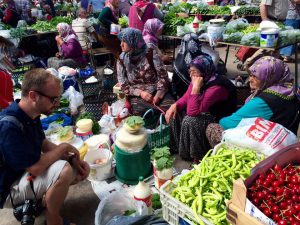
Theodore Charles, 2014-2015, Fulbright English Teaching Assistant to Turkey, doing some market shopping in Sinop
Tucked in the far Northwest corner of Turkey lies Edirne, a city that was once the capital of the Ottoman Empire. Thrace, a geographic area in southeastern Europe, has been fought over for thousands of years, changing hands as frequently as the meandering paths of the Meriç and Tunca rivers. In the early morning, mist rises off of the rivers at the city’s base, clambers over the worn stones of Ottoman bridges, and coats the wooden facades of centuries’ old homes with beads of water. Late into the evening, the rustle of broom makers working by lantern light can be heard, their meticulous weaving and binding ceaseless as the sun sets over the flowing water.
If you take the opportunity to wander the walking thoroughfares and streets that sit in the shadow of the majestic Selimiye Mosque, you will catch whiffs of savory meat cooking in sunflower oil. Edirne is Turkey’s unofficial capital of tava ciğer, or traditionally prepared fried liver. Every morning, dynasties of liver chefs carefully prepare the meat to maximize flavor and texture for the dozens of people that will line the streets around lunchtime, waiting up to an hour for the piping hot meat.
When I Wanted Time to Freeze: My Fulbright Foreign Language Teaching Assistant Experience
October 22, 2015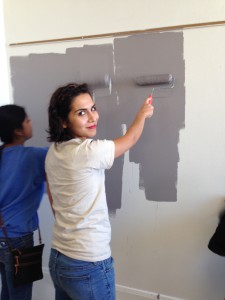
Nihan Yilmaz, 2014-2015, Fulbright Foreign Language Teaching Assistant from Turkey, painting the walls at Blackshear Elementary School, Austin, TX as part of a volunteering project
Have you ever been involved in something in which time goes by so fast that you find yourself saying, “Has it already been four months? Feels like I just started!” I have. I do not think words are enough to express how lucky I feel to participate in the Fulbright Foreign Language Teaching Assistantship (FLTA) Program, where time literally flies, leaving good memories and experiences behind.
Let me start with my language teaching experiences, which actually began before I started my Fulbright FLTA Program at the University of Texas at Austin (UT Austin). Even before my departure from Turkey, I prepared many things to share with my future students. One of them was organizing a demonstration of a Turkish bridal party or “henna night.” I brought everything that I needed to make it as authentic as possible, and last year on November 7, I held the best Turkish bridal party ever! Many guests from other UT departments came and took photos and told me that they thought everything was superb! I taught my students some Turkish wedding dance moves and played traditional songs as if it were an actual henna night. It was a memorable event, not just for my students and guests, but for me as well. Now I am thinking of doing a similar activity with one of my Turkish classes. I plan on giving some presentations about Turkey and Turkish culture, and taking every opportunity to teach them about my culture. Moreover, I will be teaching additional classes next semester. I was asked to teach informal classes on Turkish culture at UT Austin with open enrollment. This means that I will be teaching Turkish culture not just to UT students, but to whoever wants to enroll, so my audience will be getting bigger and bigger! And I am consequently getting more excited to share my culture with a wider range of people from my host community.
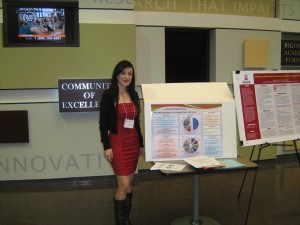
Hilal Peker, 2011-2012, Turkey, with her research findings at TexFLEC 2012 at the University of Texas
Since the beginning of my Fulbright experience, I’ve learned a great deal about the United States: its culture, people, and multiculturalism. Being part of the Fulbright Foreign Student Program means not only learning about culture and education, but also interacting with the diverse culture of the United States.
I started my journey with my pre-academic orientation in Vermont. I learned about local values and the U.S. political, health, and educational systems. I also made many wonderful friends whom I visited during winter and summer breaks. As a first-year Fulbright Foreign Student, I had the opportunity to attend a Fulbright Enrichment Seminar in Philadelphia and learn about the U.S. political system in detail just before the 2012 elections, which were brought to life through election simulations. During the seminar, we participated in community service activities and helped to clean up a local community. My election group was then invited to a home hospitality dinner during which we talked about food from all around the world. This experience was one of the most unforgettable of my entire grant.
An American in Uşak, By Leslie Esbrook, 2010-2011, Fulbright English Teaching Assistant to Turkey
October 3, 2012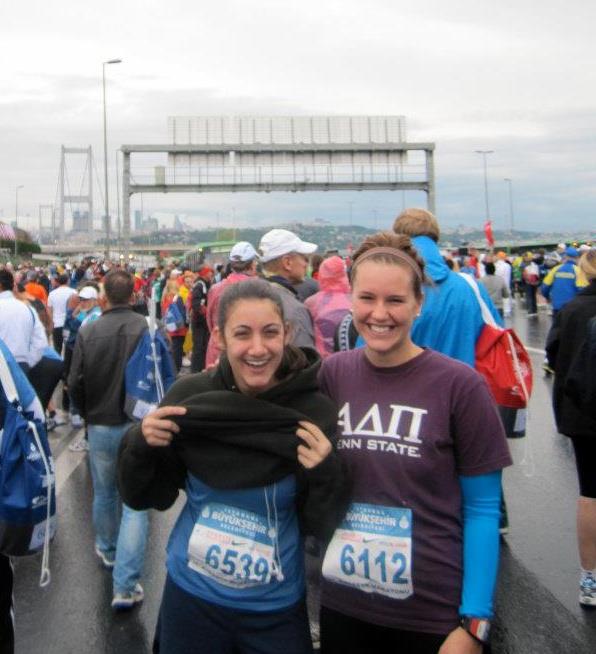 When I found out that I would be going to Uşak, Turkey, for my Fulbright English Teaching Assistantship (ETA), I didn’t quite know how to react. I looked online and only found references to ancient carpets. I looked on the map and saw that Turkey’s big cities were hours away. I looked in the dictionary and still did not know how to pronounce the name Uşak (it’s ooh-shock). Needless to say, I knew I was in for a culture shock.
When I found out that I would be going to Uşak, Turkey, for my Fulbright English Teaching Assistantship (ETA), I didn’t quite know how to react. I looked online and only found references to ancient carpets. I looked on the map and saw that Turkey’s big cities were hours away. I looked in the dictionary and still did not know how to pronounce the name Uşak (it’s ooh-shock). Needless to say, I knew I was in for a culture shock.
In reality, Uşak, as well as the other non-touristy towns of Turkey, are bursting with beauty, life and hospitality. I was assigned to Uşak University, a brand new university that possessed the dynamic energy and openness to allow me to design my own curriculum for courses, mentor students with aims of visiting the United States, improve a study abroad program and design a faculty class (with significant leeway to use non-traditional teaching methods and incorporate learning outside the classroom). As a first time teacher, I was consistently impressed by the breadth of English learning opportunities and the commitment campus-wide to support English-language activities. While statistics may indicate that Turkey is a country with rather high anti-U.S. sentiments, I experienced that the political divides cutting across ideological identities can dissolve by taking field trips to ancient ruins and sharing meals. Every day spent in Uşak was a new opportunity for me to both learn from and to teach others.
My first and main interaction with my town came through classroom experiences. Teaching at a five-year old institution with a developing English department, I helped to create curricula for first-year students and implemented them in classrooms of up to sixty students. When I started, it was challenging to be in a room of sixty raucous students, but I came to eventually know and appreciate all of them for their talents and abilities. Even the students who did not particularly want to learn English wanted to know more about American culture and asked questions about pop music or U.S. landmarks. Once I had acquired a better mastery of Turkish, I took over a class for the director of the health college and translated medical anthology texts with third year students from English to Turkish. The students’ participation and attention to detail made the two hour class pass by quickly, and left us all with a better understanding of the nuances of translation.
While eager to travel and visit other parts of Turkey, the best moments were often ones spent most simply: a picnic with students in the park, a stroll around the public gardens and a drawn-out game of backgammon over a constantly refilled strong glass of tea. By living in a place with relatively few social amenities, I became more in touch with myself. I learned, after a long while, to feel the extreme joys that Turks feel in offering help to strangers, in being with their families and in maintaining connections with friends. Turkish culture is one of a never-ending “pay it forward” mentality that is boundless in its act of giving. Sometimes in the United States, the sense of trusting those around us can be off-put by a sense of individualism and self-entitlement. Living in Uşak provided me with an opportunity to rediscover the communal trust most of us lose after childhood, an absolutely beautiful and unexpectedly rewarding gift.
This is not to say that my time in rural Turkey did not challenge, frustrate or disappoint me at times. I felt the push of bureaucracy against my American classroom conduct norms and the social pressures of conforming to my colleagues’ preferred teaching methods. Walking the streets, I suffered through high temperatures as I stuck to the shoulder and knee-covering outfits the majority of women wore, and I became frustrated at the more fluid sense of time after multiple get-togethers lasted well into the late evening hours. I constantly fielded questions from a nice older woman at my local gym as to why I was working out when from the looks of it I did not need to lose any weight. I was told repeatedly, and in a worried tone, that my diet consisted of enough sugar to fill thousands of cups of tea — even without my annual Halloween boost of candy supplies. Yet the benefits of sticking out my time as a Fulbright ETA in Turkey well outweighed any frustrations I may have had. I returned to the United States with a strong love of most things Turkish and a desire to maintain my connection to Turkey as part of my professional goals.
When I speak of Turkey, a final question that comes up frequently is religion. What was it like for me to be in a Muslim country and how was my own religious practice affected? Most people I speak with really have no sense of how religion impacts Turkish society. They have a sense that everyone walks around in hijabs and burqas. I tell people that Turkey should really be thought of as a Westernized country with an underlying respect for their traditions and culture, which emanate from religion. While this is not the place to delve deeply into the meaning of that statement, I assure Americans that moving to Turkey is culturally fascinating. As for religious practice, I found Turks to be nothing but accepting and curious to hear about holidays and observances to which they have never been exposed. I am Jewish and never hesitated to tell Turks about my religion. Everyone I met was overwhelmingly curious to hear what exactly that meant for me.
Lastly, my Fulbright ETA Program gave me an opportunity to strike up friendships over meals and, more often, dessert sampling. Experiencing the fresh tastes of Turkish food and receiving all of the health benefits of a Mediterranean diet led me to pursue an intensive side project. I published an English language cookbook of easy Turkish recipes, which was released this fall. I am proud to say it is the only Turkish cookbook written by an American non-native Turk (that I know of), and while the recipes are great, it also includes anecdotal tales of my travels in Turkey and short fun facts about the origins of the foods that underscore the rich history present in all things Turkish. In sharing my work with friends and family back home, I proudly added another dimension to their understanding of my time in Turkey and was able to bring back the intangible gift of the communal table that made my days in Uşak so joyful.
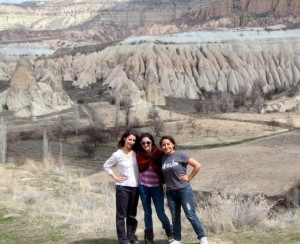 My experience in Uşak was a life-changing one and I have no doubt that it would have been so in any Anatolian town. Living in Uşak taught me an immense amount about myself and gave me a unique opportunity to impact the lives of those around me whom I never would have had the pleasure to meet otherwise. After completing my Fulbright grant, I began my first year at Yale Law School this fall, where I plan to keep up my Turkish language skills and eventually pursue a career in international law and diplomacy. In my limited free time, I even managed to publish an Op-Ed in a leading Turkish-English daily, with more hopefully to come. I encourage all Fulbright applicants to Turkey to take the time to explore towns like Uşak and see for themselves what makes the country a true cultural crossroads.
My experience in Uşak was a life-changing one and I have no doubt that it would have been so in any Anatolian town. Living in Uşak taught me an immense amount about myself and gave me a unique opportunity to impact the lives of those around me whom I never would have had the pleasure to meet otherwise. After completing my Fulbright grant, I began my first year at Yale Law School this fall, where I plan to keep up my Turkish language skills and eventually pursue a career in international law and diplomacy. In my limited free time, I even managed to publish an Op-Ed in a leading Turkish-English daily, with more hopefully to come. I encourage all Fulbright applicants to Turkey to take the time to explore towns like Uşak and see for themselves what makes the country a true cultural crossroads.
A few pieces of advice for future Fulbrighters:
- Accept every invitation. More likely than not, you, as a potential cultural curiosity in small towns, will be an immediate celebrity. In your role as a celebrity and cultural ambassador, it’s likely that you will be invited out to dinners, lunches, picnics and a whole host of other meal-based events. Say yes! The learning curve for new cultures is always infinitely steep and befriending one person inevitably leads to befriending their friends down the line.
- Be willing to experiment. If you’ve never taught in a formal setting and are worried about following precedents or your country’s common teaching practices, take a moment to consider how much potential your unique and fresh approach could bring. If you were particularly influenced by certain teaching styles in your own education, don’t be afraid to try them out or suggest them to colleagues; more often than not, your suggestions will be well-valued and respected.
- If you need help, ask. I was often faced with a situation in which I simply did not understand what was being asked of me. It is completely appropriate to pause a conversation and ask colleagues or anyone in your town for help, advice or cultural clarification. If you are one of the first American Fulbrighters living in your host community, they may not know how much knowledge you are coming in with in regards to your particular assistant English teaching assignment. The responsibility falls on you to ask for necessary information. This may even include asking about the dates of holidays and exams, grading procedures and expectations on how much material to cover.
- Make Fulbright your family. Overseas, we can all experience moments of loneliness, feelings of isolation, homesickness or frustration. Fulbrighters are one of the most intelligent, outgoing, and excited groups of people I’ve ever met. The friendships I made with fellow Fulbrighters will last a lifetime. We gave each other moral support and often discussed our comparative problems. Fellow Fulbrighters are a great source of inspiration and positivity, and can help remind you that you’re not alone.
Top photo: 2010-2011 Fulbrighters to Turkey Leslie Esbrook (left) and Kara Zinger (right) running the Istanbul Eurasia Marathon across two continents
Middle photo: 2010-2011 Fulbrighters to Turkey Jaime Gusching (left), Leslie Esbrook (center) and Jenny Coronel (right) hiking in Cappadocia, Turkey
Turkey: The Home of Ancient Monuments, Legendary Folklore Heroes and Eternal Hospitality, By Rebecca Anderson, 2009-2010, Fulbright English Teaching Assistant to Turkey
July 30, 2012
I’m a Fulbright cliché. Like many alumni, my Fulbright experience was life-changing. My first visit to Turkey as a Fulbright English Teaching Assistant (ETA) at Pamukkale University enriched my development as a global citizen in unexpected ways. Living in the industrial city of Denizli, my colleagues, friends and students shared perspectives that continue to influence me both personally and professionally.
I applied for a Fulbright ETA grant to Turkey to assistant teach English and explore how Turkish culture has influenced folklore tales featuring a trickster-ish character known as Nasreddin Hodja. American and British translations of the Hodja tales are the focus of my dissertation project. By using my analysis results of how these translations reflect resistance and receptiveness to Turkish culture, my project aimed to create a global citizenship pedagogy. The teaching approach involved students using Turkish Nasreddin Hodja tales and Western folklore as investigative tools, and identifying story themes highlighting similar and different cultural patterns. For example, although there are big differences in their motivations, the queen in Rumpelstiltskin and Nasreddin Hodja both use trickery to achieve their goals. The students and I then worked together to apply these identified patterns to contemporary local and global events. These exercises not only helped students’ critical thinking skills but their ability to negotiate and articulate their roles as global citizens.
My ETA assignment immersed me in the kind of cultural engagement that my dissertation – and the Fulbright Program – promotes. I assistant taught hundreds of students in the Hazırlık (English Preparatory Program) using my department-wide, cross-cultural studies approach. Instead of simply relating anecdotes and facts about American culture in the classroom, I focused instead on exchanging information and perspectives. I created a series of interactive PowerPoint presentations on a range of American cultural topics (such as important historical events, contemporary family and community life, the educational system, popular books and body language) which served as a model for my students. They, in turn, reciprocated with PowerPoint and video presentations about similar Turkish cultural topics. We found many commonalities between our countries and cultures (not the least of which is the popularity of the Twilight series!). The end result of these exchanges was that we developed new understandings about being global citizens in relation to each other’s culture.
My schedule was busy, but when a colleague mentioned that the understaffed department needed a discourse analysis instructor, I volunteered, excited to help create a course about analyzing the construction of meanings in communication. My colleagues appreciated the help and I was pleased to develop further my dissertation research on discourse analysis.
My relationship with my colleagues changed after this. Previously, it had been mostly social; now, my colleagues began inviting me to university workshops and international conferences located in such beautiful historic cities as Efes (Ephesus) and İstanbul. Workshop collaborations with one of my colleagues cemented a valued friendship. When I returned to Turkey during summer 2011 to participate in the U.S. Department of State’s Critical Language Scholarship Program, she and her family welcomed me to their home in the beautiful coastal town of Çeşme.
Students and their families also extended generous hospitality. On learning about my plans to visit Konya, the home city of one of my students, Ferhat Ak, he and his family appointed themselves my tour guides to the city’s beautiful mosques and gardens. They also invited me to their second home in nearby Akşehir, the purported birthplace of Nasreddin Hodja. Ferhat and his classmates explained that my interest in the Hodja tales had made them feel proud about a part of Turkish culture that previously hadn’t been very important to them.
By my assignment’s conclusion, my interactions with students, colleagues and so many others helped me realize that the Fulbright experience is about more than promoting mutual understanding between cultures; it is about individuals extending and receiving support for each other’s cultures and values.
A few application suggestions:
- Be flexible and open to new ideas. Make sure your application reflects that you are both.
- Give yourself ample time to draft and revise your application components. Ask at least two or three people (I asked several professors) to review and comment on your drafts.
- If you are applying through an institution, take your institution’s Fulbright committee’s critiques of your drafts seriously. I did, and my application benefited.
Photo: Rebecca Anderson, 2009-2010, Turkey (center), with the Ak family and a friend in their rose garden in Konya

